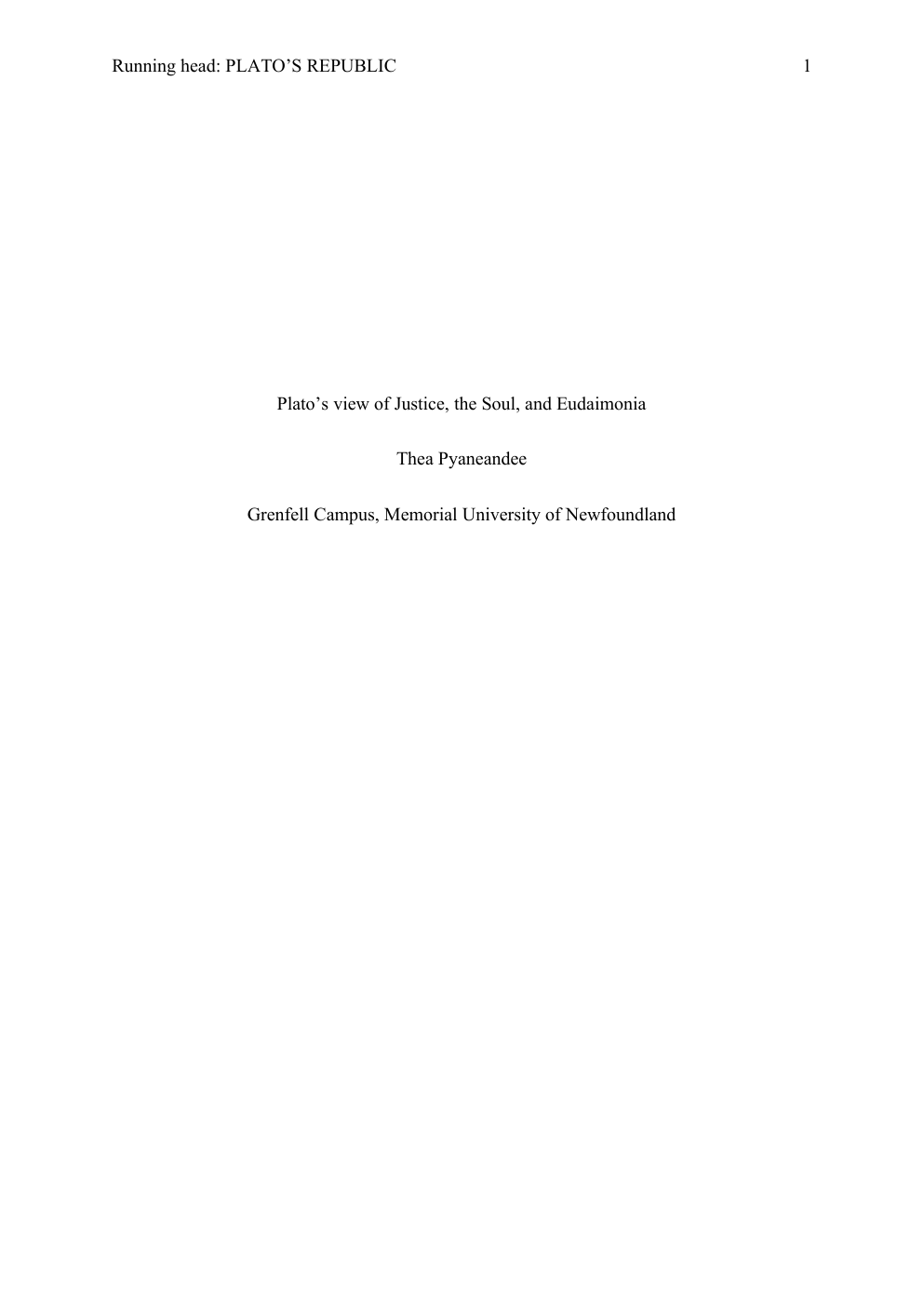Running head: PLATO’S REPUBLIC
Publié le 19/10/2022

Extrait du document
«
Running head: PLATO’S REPUBLIC
Plato’s view of Justice, the Soul, and Eudaimonia
Thea Pyaneandee
Grenfell Campus, Memorial University of Newfoundland
1
PLATO’S REPUBLIC
2
In this essay, I will discuss the work of Plato, The Republic, in which he, using the
voice of Socrates, argues that a just soul is in fact a “happy” soul.
Ultimately this journey
would lead the typical human being to reach eudaimonia, literally translated from Greek to
English as happiness, but actually meaning self-actualization.
As Richard Kraut puts it in his
article, Socrates “argues for the immortality of the soul and the existence and importance of
the forms of beauty, justice, goodness, and the like.” (Kraut, 2017).
First, in Book Two, Glaucon and Adeimantus argue against philosopher Socrates,
who is articulating Plato’s thoughts, regarding the value of a justice.
Glaucon, for one, brings
forth the Social Contract theory, arguing that if laws were to be removed, human beings will
succumb to their egoistic desires.
Second, Adeimantus argues that people only value justice
for the rewards it brings, pinpointing moral education and mystery religion being its prime
factors: “it is always practised with reluctance, not as good in itself, but as a thing one cannot
do without” (Plato, 3).
And finally, Glaucon reiterates by narrating the ‘Ring of Gyges’
which expresses that anyone possessing the ring which makes them invisible , and thus being
let off of any negative consequences, would act in the same way as the shepherd in the story.
Thus, Glaucon makes a final argument, that if given full licence to do whatever they like, a
just man would actually behave in the same way that an unjust man would: “We shall catch
the just man taking the same road as the unjust; he will be moved by self-‐interest” (Plato, 4).
Next, in Book Four, Plato starts his counter-argument against Glaucon and
Adeimantus and introduces us to his perspective of the ‘psyche’ or more specifically, the
human soul.
As Eric Brown so puts it, “Socrates seeks to define justice as one of the cardinal
human virtues, and he understands the virtues as states of the soul.
So his account of what
justice is depends upon his account of the human soul.” (Brown, 2017).
Socrates suggests
that the nature of the soul can be understood by looking at the nature of a well-formed state:
his reasoning is such that, as a state is made up of people, the character and structure of the
PLATO’S REPUBLIC
3
state should mirror the character of the people in it.
He states that it has a tri-partite structure
and consists of three main parts: the reason, appetite, and spirit (Plato, 116) and similar to a
just or stable state, a just or a “happy” soul as he puts it, is one where each part plays its
proper role.
For instance, Socrates goes on to explain what role the rational element plays in
this picture: In Book Four, reason is characterized by its ability to track what is good for
each part and the soul as a whole (Plato, 117).
In Book Four, Socrates also offers reasons in support of his understanding of the soul,
namely his “argument from opposites”.
For instance, a man might....
»
↓↓↓ APERÇU DU DOCUMENT ↓↓↓
Liens utiles
- Running.
- Plato.
- San Marino is the oldest republic in the world, its constitution datesfrom 1569.
- In 1989, the Rumanian revolution ended in the execution of the Head ofState and of the Party, Nicolas Ceausescu.
- Fiche de voc sur la politiquePOLITICSA head of stateA citizenCitizenshipUn


